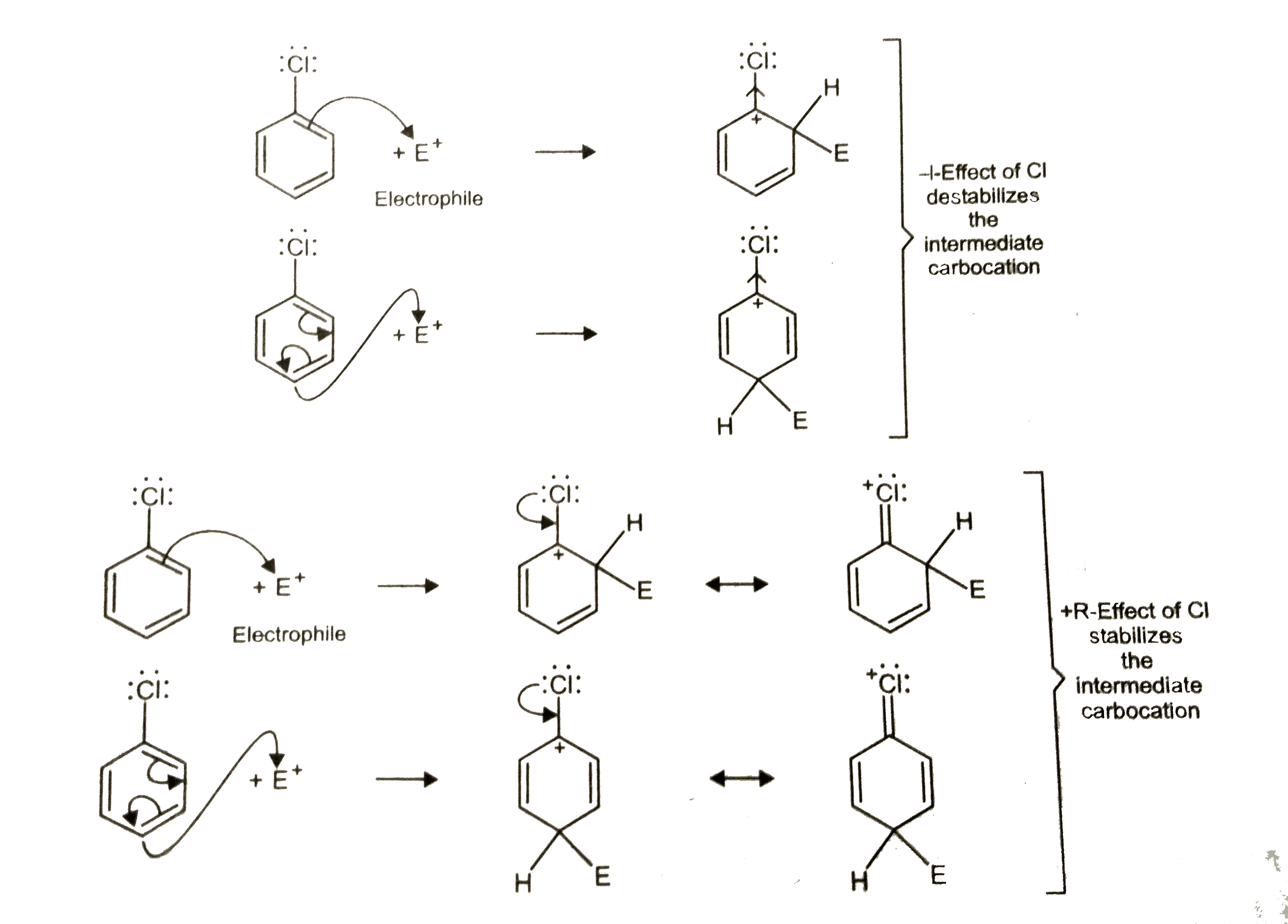Although chlorine is an electron-withdrawing group, yet it is ortho-, para-directing in electrophilic aromatic substitution reactions. Why?

Chlorine because of its -I-effect withdraws electrons from the benzene ring and hence tends to destabilize the intermediate carbocation formed during the electrophilic substitution. Conversely, the lone pairs of electrons on the chlorine atom stabilize the intermediate carbocation due to further, since resonance effect opposes the inductive effect, it makes deactivation less at o-and p-positions. thus, we conclude that in chlorobenzene, reactivity is controlled by the stronger -I-effect while orientation is controlled by the weaker resonance effect.
Topper's Solved these Questions
- HALOALKANES AND HALOARENESBOOK - PRADEEPCHAPTER - HALOALKANES AND HALOARENESEXERCISE - NCERT QUESTIONS AND EXERCISES WITH ANSWERS (NCERT INTEXT UNSOLVED QUESTIONS)
9 Videos
- HALOALKANES AND HALOARENESBOOK - PRADEEPCHAPTER - HALOALKANES AND HALOARENESEXERCISE - NCERT QUESTIONS AND EXERCISES WITH ANSWERS (NCERT EXERCISES)
22 Videos
- HALOALKANES AND HALOARENESBOOK - PRADEEPCHAPTER - HALOALKANES AND HALOARENESEXERCISE - CONCEPTUAL QUESTIONS
26 Videos
- GENERAL PRINCIPLES AND PROCESSES OF ISOLATION OF ELEMENTS BOOK - PRADEEPCHAPTER - GENERAL PRINCIPLES AND PROCESSES OF ISOLATION OF ELEMENTS EXERCISE - Curiosity Questions
2 Videos
- ORGANIC COMPOUNDS CONTAINING NITROGENBOOK - PRADEEPCHAPTER - ORGANIC COMPOUNDS CONTAINING NITROGENEXERCISE - IMPORTANT QUESTIONS FOR BOARD EXAMINATION
27 Videos
Similar Questions
Although chlorine is an electron withdrawing group, yet it is ortho-, para- directing in electrophilic aromatic substitution reactions. Why?
View Solution(i). Why are alkyl halides insoluble in water. ?
(ii). Although chlorine is an electron withdrawing group, yet it is ortho and para directing in electrophilic aromatic substitution.
View Solution
Knowledge Check
For an electrophilic aromatic substitution reaction
AChlorine is o-p directing group and also electron releasing groupBChlorine is o-p directing group and also electron withdrawing groupCChlorine is meta directing group and also electron releasing groupDChlorine is meta directing group and also electron withdrawing groupWhich of the following is not a meta-directing group in electrophilic aromatic substitution?
A−SO3HB−COOHC−CND−NH2This section contains Assertion and Reason type questions. Each question has 4 choices (1), (2), (3) and (4), out of which only one ts correct.
Assertion (A) Chlorine is an ortho para directing in electrophilic aromatic substitution reaction.
Reason (R) Chlorine is an electron withdrawing group.ABoth Assertion and Reason are correct and Reason Is the correct explanation of the AssertionBBoth Assertion and Reason are correct but Reasan Is not the correct explanation of AssertionCAssertion Is correct but Reason is IncorrectDBoth Assertion and Reason are incorrect
Introduction OF Electrophilic Aromatic Substitution Reaction
View SolutionHalogens are deactivating yet ortho,para directing in electrophilic aromatic substitution. Which statements do not explain this ?
View SolutionWhich of the following stes of groups activates the ortho and para positions in electrophilic aromatic substitutions ?
View SolutionWhich of the following reactions belong to electrophilic aromatic substitution ?
View SolutionWhich of the following reaction belong to electrophilic aromatic substitution
View Solution
